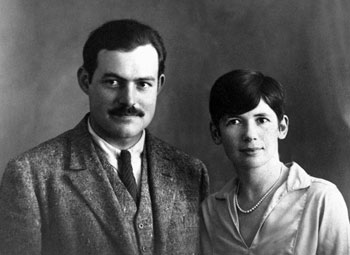
Source: Ernest and Pauline Hemingway, Paris, 1927, Wikimedia
When asked if his characters were taken from real life, Hemingway replied, “Some come from real life. Mostly you invent people from a knowledge and understanding and experience of people.” Whether or not Nick is Hemingway himself or Marjorie is a real girlfriend, the characters in “The End of Something” are round, multidimensional, and believable.
Yet you need another adjective to describe how these two characters evolve in the course of this story. That adjective is “dynamic.” Characters that are dynamic undergo some change in the course of a work of fiction. Something happens in the plot that gives them a new insight, a different understanding, or a change in outlook. Conversely, static characters do not change as the story progresses.
You have also learned that flat characters have only one or two dimensions. So, outside the realm of fairy tales, why have flat characters? Sometimes, flat characters are minor characters who serve a purpose in the story. The character Bill, who comes in at the end of Hemingway’s story, is one such useful, flat character. Based on his dialogue with Nick, we can deduce that Bill has been Nick’s confidant, and he is there to see how the break-up went. Through the dialogue with Bill, you can figure out how Nick is reacting to the break-up. Since Marjorie is gone, the minor character Bill serves as Nick’s sounding board. Because we never really learn anything much about Bill in this exchange, he remains a flat and static character.
 However, the two central characters have changed, and somewhat surprisingly. Now that you have read the end of the story, respond to these questions using your notes. When you’re finished, check your understanding to see a response.
However, the two central characters have changed, and somewhat surprisingly. Now that you have read the end of the story, respond to these questions using your notes. When you’re finished, check your understanding to see a response. - How does Marjorie’s reaction to the break-up surprise you?
- How does Nick’s reaction to Marjorie’s action surprise you?
Sample Responses:
- In the beginning of the story, Marjorie seems to hang on Nick’s every word and cater to his every wish. When he breaks up with her, she acts proud, strong, and resolved. You feel fairly certain that she will be able to go on without him because she took charge and didn’t create a scene.
- Based on his somewhat callous attitude in the beginning of the story, you might not have expected him to be so upset about the end of the relationship that he’d lie down with his face in the blanket. Though he tells Bill that it went fine, his actions contradict his words.

Source: A Moveable Feast, life serial, Flickr
Now, how will you directly characterize Nick and Marjorie? Review the list of adjectives below that you assigned to them in the characterization exercise in Section 3. Decide which ones you might want to qualify based on new evidence you’ve discovered in the last part of the story. “Qualify” in this case means to “to limit or modify the meaning.”
For example, you characterized Marjorie as the character who is “inquisitive.” That adjective might need to be qualified based on this last section. Maybe Marjorie is not the eager learner we meet in the beginning of the fishing trip, at least from Nick’s perspective. Perhaps Nick is just picking a fight when he accuses her of knowing everything. Is there some truth in that accusation? Find two other adjectives you would like to qualify.
 Use your notes to explain why. When you’re finished, check your understanding to see a possible response for several characteristics that have been “qualified.” Not all of the adjectives below will have sample responses since answers may vary.
Use your notes to explain why. When you’re finished, check your understanding to see a possible response for several characteristics that have been “qualified.” Not all of the adjectives below will have sample responses since answers may vary. - Taciturn
- Inquisitive
- Romantic
- Dependent
- Intuitive
- Encouraging
- Critical
- Indecisive
- Pessimistic
- Insensitive
Sample Responses:
Inquisitive: From Nick’s perspective, Marjorie is not the eager learner we met in the beginning of the fishing trip. He accuses her of knowing everything.
Dependent: This is the most surprising shift. Once she knows that Nick wants to break up with her, Marjorie acts very independently. She leaves without begging or creating a scene. She insists that she is going to take the boat and that Nick can walk back.
Indecisive: When Nick told Marjorie that it wasn’t fun anymore, he made a decision to break up. Of course, he was afraid to look at her as he was delivering the bad news.
Insensitive: This seems to be the greatest change in Nick. He is emotionally impacted by Marjorie’s response, appearing to be very sad and wanting to be alone.

Source: Something, Wordle, IPSI
“Something” is a pronoun meaning “some indeterminate or unspecified thing.” Hemingway’s vague word choice of “something” in the title causes us to have different responses to the several things that have ended: a lumber industry, a town, a fishing trip, and a relationship. By using that one word, “something,” Hemingway invites readers to look deeply into layers of meaning and the complexity of characters in his short story.